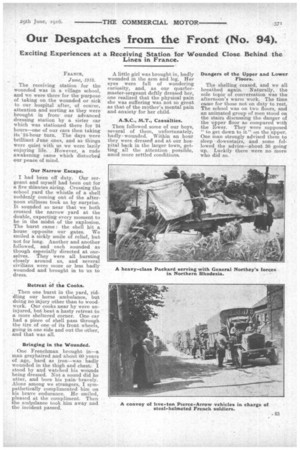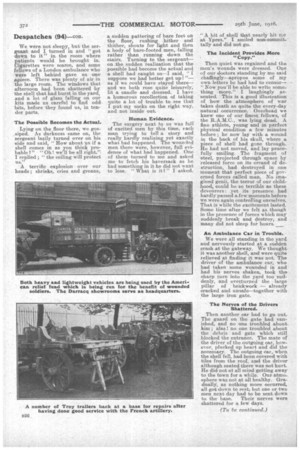Our Despatches from the Front (No. 94).
Page 23

Page 24

If you've noticed an error in this article please click here to report it so we can fix it.
Exciting Experiences at a Receiving Station for Wounded Close Behind the Lines in France.
The receiving station for the wounded was in a village school, and we were there for the purpose of taking on the wounded or sick to our hospital after, of course, attention and sorting as they were brought in from our advanced dressing station by a sister car which was stationed there for 24 hours—one of our cars then taking its '24-hour turn. The days were brilliant June ones, and as things were quiet with us we were lazily enjoying life. However, a rude awakening came which disturbei our peace of mind.
Our Narrow Escape.
I had been off duty. Our sergeant and myself had been out for a five Minutes airing. Crossing the school yard the whistle of a shell suddenly coming out of the afternoon stillness took us by surprise. It sounded so near that we both crossed the narrow yard at the double, expecting every moment to be in the midst of the explosion. The burst came : the shell hit a house opposite our gates. We smiled a sickly smile of relief, but not for long. Another and another followed, and each sounded as though especially directed at ourselves. They were all bursting closely around us, and several civilians were more or less badly wounded and brought in to us to dress.
Retreat of the Cooks.
. Then one burst in the yard, riddling our horse ambulance, but doing no injury other than to woodwork. Our cooks near by were uninjured, but beat a hasty retreat to a more sheltered corner. One car had a piece of shell pass through the tire of one of its front wheels, going in one side and out the other, and that was all.
Bringing in the Wounded.
One Frenchman brought in—a man greyhaired and about 60 years of age, hard as iron—was badly wounded in the thigh and chest. I stood by and watched his wounds being dressed. Not a sound did he utter, and bore his pain bravely. Alone among we strangers, I sympathetically complimented him on his brave endurance. He smiled, pleased at the compliment. Then the ambulance took him away and the incident passed.
A little girl was brought in, badly wounded in the arm and leg. Her eyes were full of wondering curiosity, and, as our quartermaster-sergeant deftly dressed her, one realized that the physical pain she was suffering was not so great as that of the mother's mental pain and anxiety for her child.
A.S.C., M.T., Casualties.
Then followed some of our boys, several of them, unfortunately, badly. wounded. Within an hour they were dressed and at our hospital back in the larger town, getting all the attention possible, amid more settled conditions.
Dangers of the Upper and Lower Floors.
The shelling ceased, and we all breathed again. Naturally, the sole topic of conversation was the afternoon's warm work. The time came for those not on duty to rest. The school was on two floors, and an animated group of men stood on the stairs discussing the danger of the upper floor as compared with the lower. They were supposed "to get down to it" on the upper. One man strongly advised them to sleep downstairs, and some followed the advice—about 30 going up. Luckily there were no more who did 80. We were not sleepy, but the sergeant and I turned in and got down to it" in the room where patients would be brought in. Cigarettes were scarce, and some fellows of a London ambulance who were left behind gave us one apiece. There was plenty of air in the large room. The windows that afternoon had been shattered by the efiell that had burst in the yard, and a lot of glass falling on our kits made us careful to find odd bits, before they found us, in tender parts.
The Possible Becomes the Actual.
Lying on the floor there, we gossiped. As darkness came on, the sergeant lazily turned over on his side and said, "How about us if a shell comes in as you think probable ?" " Oh we'll be all right," I replied ; " the ceiling will protect us.e
A terrific explosion over our heads ; shrieks, cries and groans, a sudden pattering of bare feet on the floor, rushing hither and thither, shouts for light and then a body of bare-footed men, falling rather than running down the stairs. Turning to the sergeant-on .the sudden realization that the possible had become the actual and a shell had caught .us—I said, " suppose we had better get up! "— as if we could have stayed there— and we both rose quite leisurely, lit a candle and dressed. I have a humorous recollection of taking quite a lot of trouble to see that I put my socks on the right way. and not inside out.
Human Evidence.
The surgery next to us was full of excited men by this time, each man trying to tell a story and really hardly realizing yet exactly what had happened. The wounded men there were, however, full evidence of what had happened. One of them turned to me and asked me to fetch his haversack as he had something in it he did not want to lose. "What is it?" I asked. "A bit of shell that nearly hit me at Ypres." I smiled non-commit.tally and did not go.
The Incident Provides More o Then quiet was regained and the men's wounds were dressed. One of our doctors standing by me said chalfingly—apropos some of my own letters he had had to censor" Nowyou'll be able to write something more." I laughingly assented. This is a good illustration of how the atmosphere of war takes death as quite the every-day natural occurrence. Overhead we knew one of our finest fellows, of the R.A.M.C., was lying dead. A flne athlete, young and in perfect physical condition a few minutes before ; he now lay with a wound in the back of his skull, where a piece of shell had gone through. He had not moved, and lay peacefully smiling. The fragment of steel, projected through space by released force on its errand of destruction, had destroyed in one moment that perfect piece of governed forces called man. No imagined genii, the terror of our childhood,, could be so terrible as these devourers : yet its presence had hardly passed aefew moments before We were again controlling ourselves. That is while the excitement lasted. Some time after we felt as though in the presence of forces which may suddenly break and destroy, and many did not sleep fol. hours. , An Ambulance Car in Trouble.
We were all standing in the yard. and nervously started at a sudden crash at the gateway. We thought it was another shell, and were quite relieved at finding it was not. Thedriver of the ambulance car, who had taken some wounded in and had his nerves shaken, took the sharp turn into the yard too suddenly, and overturned the large pillar of brickwork — already cracked and unsafe—together with the large iron gate.
The Nerves of the Drivers Shattered.
Then another car had to go out, The guard on the gate had vanished, and no one troubled about him ; alas ! noone troubled about the debris and gate which still blocked the entrance. The mate of the driver of the outgoing car, however, plucked up heart and did the necessary. The outgoing ear, when the shell fell, had been covered with tiles from the roof, and the driver although seated there was not hurt. He did not at all mind getting away to the town for a while. Our atmosphere WAS not at all healthy. Gradually", as nothing more occurred, all got down to rest, but one or two men next day had to be sent down
to the base. Their nerves were shattered for a fewi days.






























